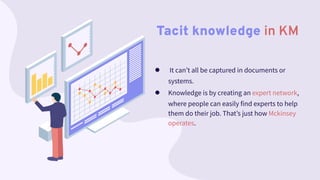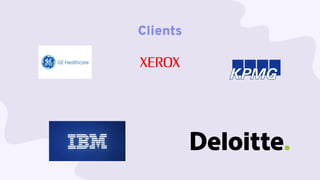Knowledge Management in Consulting Industry
- 2. TABLE OF CONTENTS 01 Introduction 02 Strategies 03 Tools 04 Case Study & Conclusion Types, Mission, Benefits of KM in Consulting Personalisation (tacit) and Codification (explicit) Project Journey, Intranet, Team Spaces, Portals, Knowledge Bases and ESN
- 4. Introduction ● Knowledge Management is the process of transforming information and intellectual assets into long-term value for an organizationʼs clients and employees. ● The central aim of Knowledge Management is to get the right information to the right people at the right time, to help people share productivity and insights, and to improve the productivity of teams.
- 5. Types of KM
- 6. Explicit knowledge in KM ● The captured facts, figures,Data and information which physically exists in repositories ● Can be documented, transmitted, and most importantly, learned by outsiders. Itʼs any information thatʼs easy to share and understand.
- 7. Tacit knowledge in KM ● It canʼt all be captured in documents or systems. ● Knowledge is by creating an expert network, where people can easily find experts to help them do their job. Thatʼs just how Mckinsey operates.
- 8. MISSION KM
- 9. Benefits OF KM ● Fosters collaboration ● Increases employee efficiency ● Prevents loss of knowledge ● Improves decision making ● Improves policy making ● Stimulates innovation ● Better reputation ● Higher personal satisfaction
- 11. Personalization Strategies create dialogues between individuals, not objects in a database through brainstorming sessions and one-to-one conversations. building networks of people not only face-to-face but also virtual Consultants are expected to return phone calls to colleagues very quickly, by transferring people between offices
- 12. Bain’s London office Marcia Blenko is a partner The client desired Bain to help it expand through offering new products and services – the project required geographic and product-line expertise, a broad understanding of the industry and creative thinking. She left voicemails with them and also checked Bainʼs “people finder” database for more contacts. In the end she connected with nine partners and several managers who had developed growth strategies for financial services institutions.
- 13. Codification Strategies The reuse of knowledge saves work, lowers communication costs, and enables a company to take on more projects Knowledge is codified using a “people to documents” approach. Retrieve codified knowledge without having to contact the person who originally developed it Possible to achieve scale in knowledge reuse and the ability to grow the business.
- 14. Ernst & Young teams Randall Love is a consultant He was preparing an important bid for a large industrial manufacturer who needed help installing an enterprise resource planning system. He searched the electronic knowledge management repository and found several helpful documents containing previously developed solutions, and value propositions. Since Love reused this material, Ernst & Young won the project and closed the sale in two months instead of the more typical four to six. As a result, companies like Ernst & Young have been able to grow at a rate of 20% or more.
- 17. How consulting firm work? Entire project journey
- 18. Intranets An intranet is a private computer network that uses internet protocols and network connectivity to share part of an organizationʼs operations with its employees. Eg. is Microsoft Sharepoint Team Spaces for Collaboration Team space platforms include Box, Chatter by Salesforce, or Confluence by Atlassian are collaborative workspaces for sharing documents, files, reports and plans.
- 19. Web Conferencing Videoconferencing technology allows two or more locations to communicate through two-way audio and video transmissions.Eg. Microsoft Teams, Slack Calls, or Zoom. Portals Portals are websites that provide personalized capabilities to users through customization, building blocks, and the integration of multiple sources.
- 20. Repositories and Knowledge Bases Repository designed to store answers or solutions to problems, and to facilitate rapid search, retrieval and reuse. Eg. Document360. An Enterprise Social Network is an internal, private, social networking platform. Threaded discussions are tools for subscribers to carry out discussions on specific topics. Eg. FB, Google Threaded Discussions and Enterprise Social Networks (ESNs)
- 22. Case Study
- 23. About M&R Consulting A Boutique Consulting Firm specializing in: ● Strategy Consulting ● Healthcare ● Business Process Outsourcing ● Supply Chain Consulting ● IT Consulting
- 24. Clients
- 25. The Challenge ● Client: A renowned Strategy Consulting Firm ● Recognized their current inefficiencies in managing the internal knowledge capital ● Had never focused on their knowledge management needs ● Asked McMann & Ransford (M&R) to assist them in evaluating their needs and implementing best practices for knowledge management in use in the industry
- 26. The Situation ● Each of the firmʼs offices had its own informal network of knowledge sharing practices ● The firm had done some very unique and valuable project for clients and lost the experience and knowledge when the consultants left the firm ● The firm was beginning to see much more staffing of projects from different offices and needed tools to facilitate collaboration ● There were no vehicles to share work templates, tools, and best practices ● There was a feeling that they were having to always reinvent the wheel ● Only the more senior personnel knew who to contact for expert knowledge on unique problems and solutions ● Management recognized the need to work smarter and leverage the experiences of the firm nationally
- 27. The Results ● M&R assisted the project team in identifying all of the needs of the firm for knowledge management ● M&R pointed out new ways to capitalize on the firms knowledge capital based on its experiences in many similar experiences with other leading consulting organizations ● M&R identified software solutions to meet the firms need and assisted in evaluating and selecting the best solution ● M&R also advised the firm on the integration of this solution with other initiatives being undertaken ● M&R assisted throughout the implementation, including the important steps in developing a change strategy to insure the benefits of the knowledge management solution we realized
- 29. Conclusion Management consulting firms have been leading the way for decades and they provide excellent examples for other companies to follow. Good Knowledge Management requires the perfect combination of people and technology
- 30. THANK YOU






























